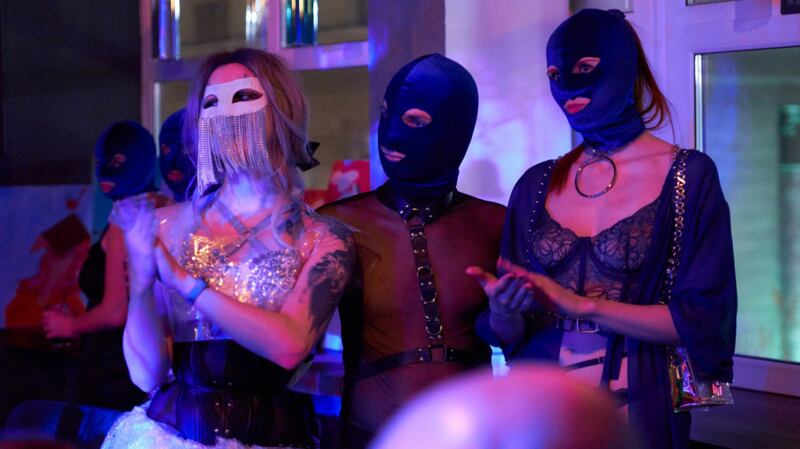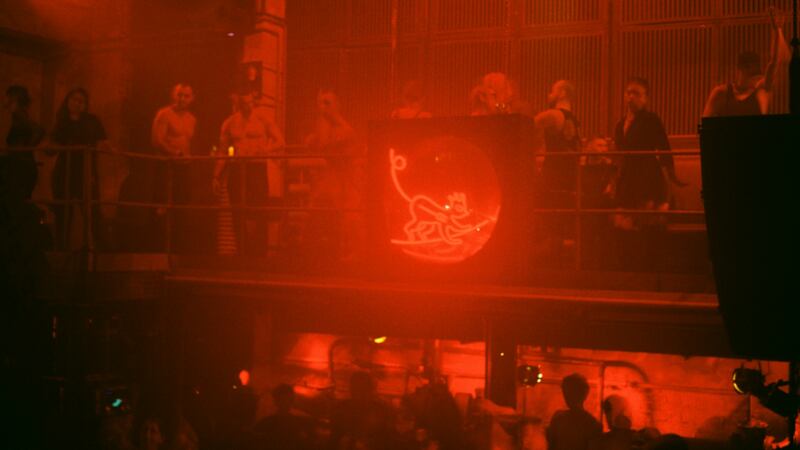Russian authorities have sex parties on their radar after the Supreme Court ruled in November to classify the LGBTQ movement as an “extremist ideology”.
In recent months, there have been at least six cases of police raids at public and private parties with sexual themes in different regions of the country. Russia.
LOOK: The camps with “cyber slaves” who are dedicated to scams on the internet
Some of the events had no connection to the LGBTQ community.
In February, Russian police raided a nightclub in the city of Yekaterinburg, 1,500 kilometers east of Moscow, where a sex-themed party called “Blue Velvet”, in which its participants wore balaclavas to hide their identity.
At least 50 police officers took part in the operation and some of them appeared to be members of the FSB’s special security forces, party organizers told the BBC’s Russian service.
The police forced all participants to unmask and asked them for personal information, said Stanislav Slovikovsky, one of the organizers.
“They asked me if there were gays and lesbians at the party any [si había alguna] LGBT propaganda. They also asked if people used drugs, although they seemed much less interested in that,” he said.
For more than a decade, Russian authorities have tried ban homosexuality and disenfranchise members of the LGBTQ community of their rights with a series of laws that identify the LGBTQ movement as an extreme ideology.
In 2013, the lower house of Parliament approved a bill that banned so-called “LGBT propaganda”, which in practice limited any public debate about the rights of this community and other issues related to it.
Even stricter anti-LGBTQ legislation was implemented last year.
In July, Parliament prohibited gender transitionwhich had been legal since 1997, and banned gender-based surgical procedures, hormone therapy and sex change in official documents.
Last November, the Russian Supreme Court designated the LGBTQ movement as “extremist ideology”.
In this way, they add the movement to the list of extremist groups, along with the Islamic State and Jehovah’s Witnesses.
Support the community LGBTQ It is now a crime in Russia, punishable by up to 10 years in prison.
erotic performances
Nothing was done at the “Blue Velvet” party that could constitute a crime, Stanislav Slovikovsky told the BBC.
He claimed that at his party there were erotic performances and some of them had elements of BDSM, a variety of sexual practices and role plays, in which participants were invited to participate.
At the same time, Slovikovsky said, there were no expectations no pressure on guests to have sex.

Yekaterinburg city police later issued a statement stating that security forces They were carrying out a “preventative” operation that night.
“No one can rule out that the LGBTQ community may hold its meetings in the form of BDSM parties,” said Dmitry Choukreev, a member of the Yekaterinburg public chamber.
Despite increasing repression by authorities against the LGBTQ community in recent years, “those people haven’t disappeared,” he said.
“They still need to have fun and put their ideas into practice. They could celebrate these types of events dressed as BDSM, which is not prohibited for now”he said.
Sex parties in Russia have been taking place in major cities over the past decade, mostly limited to cosmopolitan urban settings.
It is estimated that a relatively small proportion of the population participates in them and attracts middle-class people with jobs in creative or technical industries.
They were intended to symbolize liberalism and tolerance within society Russian, but with the approval of increasingly conservative laws, these parties become increasingly clandestine.
The ‘Almost Naked’ party scandal
Russian authorities’ crackdown on sex parties intensified in December following the birthday party of influencer and television presenter Anastasiya Ivleeva, in which the dress code required guests to appear dressed “nearly nude”.
The party was publicized on social media and among the guests were numerous important Russian celebrities, including Kseniya Sobchak, daughter of Vladimir Putin’s longtime associate and mentor Anatoly Sobchak, as well as veteran pop singer Philipp Kirkorov.

While most of those in attendance wore mesh tops and lingerie, some decided to wear more revealing outfits. Rapper Vacio appeared with just a sock on his genitals.
Event photos provoked outrage Among many.
Vacio was jailed for 15 days on charges of vandalism and fined 200,000 rubles (about $2,154) for his clothes.
Ivleeva herself was fined 100,000 rubles ($1,077) for organizing the party.
Trouble began for the hostess and her guests when Russian President Vladimir Putin saw the photos.
Some of the celebrities who attended the event said they had already canceled media appearances and were threatened with criminal action.
Putin doubled down on “traditional values” rhetoric after the presidential elections in Russia that allowed him to win his fifth term.
‘Bullying’
Recent raids at sex parties followed the same pattern: Police showed up, ordered everyone to get down on the floor, and began collecting data from attendees.
Most attacks were broadcast by pro-Kremlin mediaand some television channels revealed personal information about participants.
The repression not limited to public events. In at least two cases the police showed up at a private party.
Some of the male guests fThey were threatened with being sent to fight in the war in Ukraine, one partygoer told the BBC.

In the wake of increased attacks and public shaming, party organizers are backtracking.
In February, Moscow queer techno party Popoff Kitchen, well-known among the local LGBTQ community, and the sexually themed Kinky Party announced that They would stop holding events in Russia.
“We have received notice that sex-themed events will not be permitted from now on,” Kinky Party organizers said in a statement.
“It is impossible to work knowing that safety cannot be guaranteed.” [de sus invitados]” Nikita Egorov-Kirillov of Popoff Kitchen told the BBC.
“All those raids, intimidation, taking people’s personal information… If that happens once, you won’t be able to convince people that your party is safe again,” he said.
Source: Elcomercio
I am Jack Morton and I work in 24 News Recorder. I mostly cover world news and I have also authored 24 news recorder. I find this work highly interesting and it allows me to keep up with current events happening around the world.

:quality(75)/cloudfront-us-east-1.images.arcpublishing.com/elcomercio/WKUGT4BIRRARFDZGPNVOAJFS24.jpg)

:quality(75)/cloudfront-us-east-1.images.arcpublishing.com/elcomercio/F5KXOG5KVRGQRDKPC7CMAQT5CY.jpg)
:quality(75)/cloudfront-us-east-1.images.arcpublishing.com/elcomercio/3ER6RUZP5BB5PJQHY2PKGYUWWU.jpg)
:quality(75)/cloudfront-us-east-1.images.arcpublishing.com/elcomercio/UI6GWWU2V5C2TMUQOGGHKAVBSE.jpg)
:quality(75)/cloudfront-us-east-1.images.arcpublishing.com/elcomercio/L3KZOJTOIJCA5FIJ75IO7ACGAM.png)
